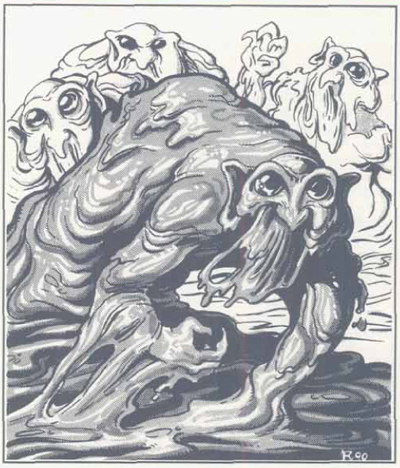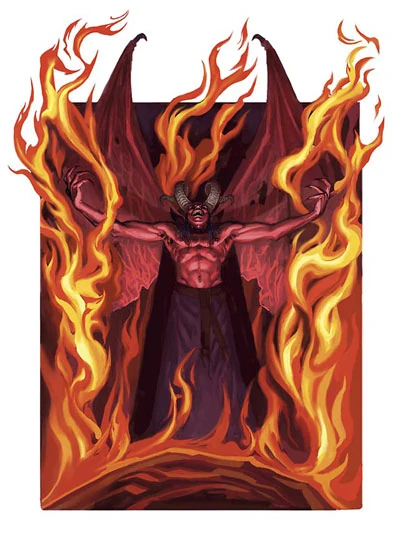This has been sitting half done for like a week now, so I'm just going to fucking finish it. Its ramble-y and probably won't be good but I need to do it and move on.
As you all have probably figured out by now, I like talking about and fiddling with mechanics. Mechanics as metaphor, mechanics guiding good roleplay, and mechanically clever systems are all things that I enjoy thinking about and feel pretty confident talking about. As a DM or player, I also see the value in many things that are not mechanically based, but I feel much less comfortable giving advice or talking about those things. How am I supposed to give advice on describing rooms when I'm looking for that advice myself?
As you all have probably figured out by now, I like talking about and fiddling with mechanics. Mechanics as metaphor, mechanics guiding good roleplay, and mechanically clever systems are all things that I enjoy thinking about and feel pretty confident talking about. As a DM or player, I also see the value in many things that are not mechanically based, but I feel much less comfortable giving advice or talking about those things. How am I supposed to give advice on describing rooms when I'm looking for that advice myself?
Because of my relationship with mechanics of a game being responsible for my outlook and understanding of those games, I generally look at skills as a tool to change how a character interacts with the game world.
At its most basic, monster lore allows your character to try to decipher the clues before or during your encounter to learn about your foe and better understand what you are up against. This is boring when you learn things you already know, but is awesome when that information allows you and your party to change how the encounter occurs in a interesting and meaningful way.
This is the sort of interesting interaction that I would like to have in my game.
During Alex's princess game, I played Bhaltair Blueheart, the King's Knight. I don't remember exactly how the proficiencies broke down, but I was a master of sword and shield combat. Each round I could choose whether I wanted to block with my shield, bash a person with it, or use it to protect someone else. I approached each round of combat differently knowing I that I had the choice of going all out or defending an ally if it was strategically important.
That is the sort of interesting combat dynamic change that I hope to have in my game.
In my uncle's game, there is a weapon proficiency called shield use which gives a +2 bonus to AC and saves when wielding a shield. This changes the numbers of fighters, allowing them to have lower AC, but doesn't really add anything new or change how the class is played.
This is the sort of thing I'd like to avoid.
So like I talked about last post, I'm planning on having the skill system be on a five point scale. Here I'm going to outline the ideas of each rank and also give an example in the form of monster lore.
If you have one box in a skill, its pretty analogous to a non-weapon proficiency: You are now able to make checks in a non-combat situation which will provide a benefit. These are pretty by the book.
Gerry's skill in monster lore allows him to look at tracks, scat, and the environment of a monster in order to get an Int check at -4 to figure out what it is and its powers are. If he can go off of a description of the monster, he can make the check at par. If Gerry can see the monster and is facing it down himself, then he gets a +4 on the check (not that it will do him much good).
When you get up to two boxes checked, the skill now changes how you approach combat. You now have an active check you can make during combat.
Gerald has learned quite a bit from studying his manuals and now can apply his skill. Once per combat encounter (am I really implementing per combat uses on skills?) when making an attack he may make an intelligence based check. If he succeeds, Gerald has managed to apply his theory to give himself a +4 to hit, +4 to damage, or make the monster make a save or suffer a reasonable debilitation. (stab the dragons spit gland with a spear so if it fails its save it has to take an action before breathing fire)
With three boxes checked you now receive a small numerical buff and a passive ability. This is as far as reasonable normal universed characters usually get. Past this is mostly only possible for immortal characters (like those in Hell) or in bullshit over the top campaigns (like one where you journey to the bottom of Hell and beat up the Devil).
Geraldo is now considered a master Lore-er of monsters. His understanding of types of attacks and abilities monster's possess grants him a +2 (1?) on all saves vs monsters he has successfully identified. In addition, whenever any "natural" attack or abilities is used, (not granted by a class) Geraldo can ask the DM to make an int check to get the (meta) stats on the attack/ability.
Past this I don't even know what to do. Obviously additional bonuses are in order for levels 4 and 5, and I suspect with the nature of the world of Hell being they will be more rediculous and over the top than reasonable and normal. I'm thinking level 4 gives noncombat bonuses again, and level 5 gives in combat bonuses. Maybe a stat increase. I'm really not sure.
Progression with skills will be completely separate from levels. Because of how individualized these all are I'm also changing each character to have 1 rank 2, 1 rank 1, and one rank 1 of choice.
As you can tell, this whole idea is much more of a mess than I though it was when I sat down to write about it. I'm going to publish it because when I don't publish things I stop writing, and I don't want to do that.
Gerald has learned quite a bit from studying his manuals and now can apply his skill. Once per combat encounter (am I really implementing per combat uses on skills?) when making an attack he may make an intelligence based check. If he succeeds, Gerald has managed to apply his theory to give himself a +4 to hit, +4 to damage, or make the monster make a save or suffer a reasonable debilitation. (stab the dragons spit gland with a spear so if it fails its save it has to take an action before breathing fire)
With three boxes checked you now receive a small numerical buff and a passive ability. This is as far as reasonable normal universed characters usually get. Past this is mostly only possible for immortal characters (like those in Hell) or in bullshit over the top campaigns (like one where you journey to the bottom of Hell and beat up the Devil).
Geraldo is now considered a master Lore-er of monsters. His understanding of types of attacks and abilities monster's possess grants him a +2 (1?) on all saves vs monsters he has successfully identified. In addition, whenever any "natural" attack or abilities is used, (not granted by a class) Geraldo can ask the DM to make an int check to get the (meta) stats on the attack/ability.
Past this I don't even know what to do. Obviously additional bonuses are in order for levels 4 and 5, and I suspect with the nature of the world of Hell being they will be more rediculous and over the top than reasonable and normal. I'm thinking level 4 gives noncombat bonuses again, and level 5 gives in combat bonuses. Maybe a stat increase. I'm really not sure.
Progression with skills will be completely separate from levels. Because of how individualized these all are I'm also changing each character to have 1 rank 2, 1 rank 1, and one rank 1 of choice.
As you can tell, this whole idea is much more of a mess than I though it was when I sat down to write about it. I'm going to publish it because when I don't publish things I stop writing, and I don't want to do that.






